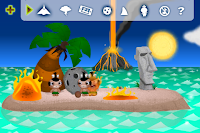With so much additional content being added to the core game I was curious to see how the game introduced itself to a new player. I decided to conduct a very-mini playtest, consisting of 1 tester. Step forward test subject number 1 (the girlfriend).
Test subject number 1
Preferred genre - Strategy/Puzzle
Favourite game - Ceasar 3
Systems owned - iPhone and PC/Mac (some play time on the Wii)
Average time playing per week - 2-3 hours
*Disclaimers*
- I had no contact with the game before the playtest - I didn't know anything about the controls or content. Not ideal for a playtest, but it was necessary (the iPhone used for the playtest was owned by test subject number 1).
- I deliberately didn't allow test subject 1 to read any information about the game before the playtest - not even the reviews. She would normally have read the reviews, and learnt about the game to a much greater degree before purchasing. A lot of the issues encountered wouldn't have been encountered in real life (as the tester would have read around the game before commencing). I wanted to enact a spontaneous purchase.
I'm just going to write what happened:
Before the game loads, an 'Open Feint' window appears and requests to use the players data. The tester (hereafter referred to as her, or she) was unsure what this was for. She thought it was a different application altogether and guessed it was some form of social tool (it is, but there's no explanation - what it is, or what you'd want to sign up to it for).
Next she asked if they want push notifications. "Are these warning messages? How often will I be warned?"
The game starts and informs her that episode 29 is loading - "Episode 29? Why start on episode 29?"
The game loads with 1 pygmy on the screen... it picks up a fishing rod and starts to fish. Almost immediately it is pulled into the sea and eaten by a shark - much to her dismay. She's left with no one on the screen anymore. She doesn't notice the 'add pygmy' button in the top of the screen. She gets distressed.
With some assistance she notices the controls in the top of the screen. They load the help, which offers some explanatory text... but this is rather small and hard to read. There's a total of 34 help pages - too much for her to take in. They started reading... then gave up. She gets distressed. "Ice monster? What? I'm meant to throw the pygmies at the ice monster? How? Why?"
She creates a couple of pygmies and tries dragging one around. Succeeds in dropping the pygmy into the sea, where it quickly drowns before she can pull it out again. She gets distressed.
After a couple of minutes she is starting to get to grips with the controls. However, they still felt overwhelmed - "There's too much...".
Pulling up the map she accidentally takes the pygmies to the 'underwater zone' "Are we underwater now? Why?". She panics, fearing the pygmies would drown.
Finding the toggle controls (where the player has the ability to toggle various interactive aspects of the zones on and off). She toggles a couple of options, but is unsure what they control "Are they on or off? What are they?"
After 5 minutes of the playtest she abandons the game. "I just don't know what to do..." She believed she was playing the game incorrectly, that there was a way to be benevolent and save the pygmies from their rather gruesome fates.
After playing
After playing she went online to see what she was missing. Reading the Wikipedia entry, the tester realised the whole point of the game was essentially to torture and kill the pygmies in a variety of amusing ways... This didn't appeal to them. The game was not to their taste, but they were still able to find several issues. The biggest being:
- The game never introduced itself to the player - there was insufficient help and no tutorial. It was also unclear exactly what kind of game it was (a sim-killer)




